Do., März 31st 2022
Die Schweiz hebt diese Woche die letzten Covid-19-Beschränkungen auf. Das bedeutet, dass das Leben in der Alpennation wieder so aussehen wird wie vor dem Auftreten der Coronavirus-Pandemie vor mehr als zwei Jahren.
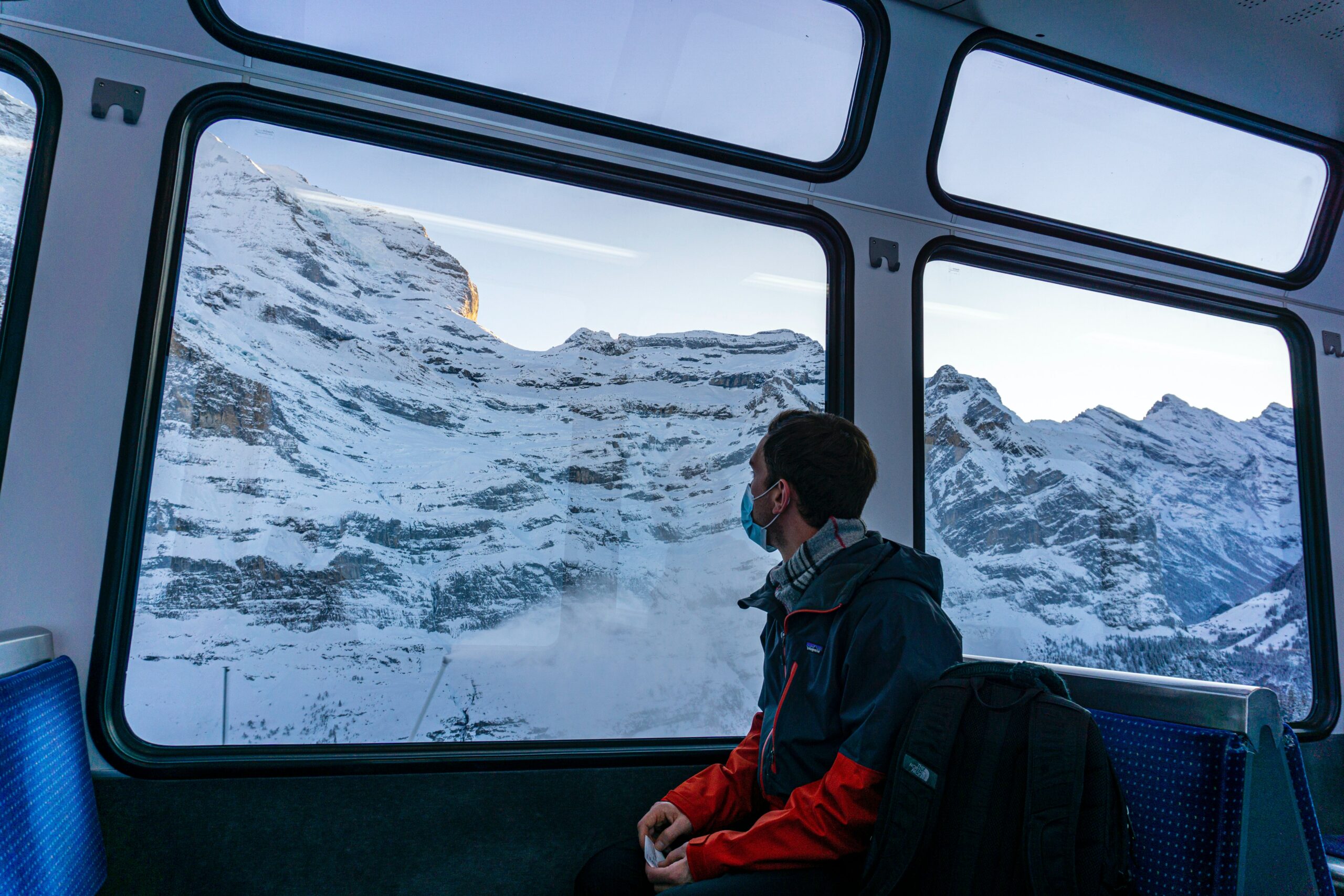
A masked traveler looks out the window of a Swiss train. Switzerland’s ski slopes were the only ones open in Europe during the 2020-2021 winter.
Government officials announced Wednesday that masks will no longer be required on public transportation nor in health care facilities beginning April 1. Moreover, those who test positive for Covid-19 will not be required to self-isolate for five days.
“We can’t say that the crisis is over, but we can certainly say that the acute phase of the crisis is over,” Swiss Interior Minister Alain Berset said at press conference Wednesday.
Since mid-February, people in Switzerland have not been required to show Covid certificates or wear masks in stores, bars, restaurants, schools, theaters and sports facilities. There are no restrictions on large gatherings and travelers do not have to provide negative Covid-19 tests or vaccination passes to enter the country.
Health officials announced that although there were 16,462 new cases of the virus this week, that this is a decrease of nearly 40% since last Wednesday. Moreover, only 165 people across the country have been hospitalized this week for Covid-related illnesses and only 17% of intensive care beds are being used by Covid-19 patients.
Berset underscored that the decision to lift all restrictions was made because Swiss hospitals are “stable,” and that the country is “very much on track.” He added that the Swiss population has achieved a “very high immunity” through recovering from Covid-19 exposures (about 41% of the country has reported testing positive) and vaccines (about 70% of the population is vaccinated). The high immunity has prevented Swiss health care facilities from becoming overrun with Covid hospitalizations – which has always been the measure by which Switzerland has made its decisions regarding Covid, Bercet said.
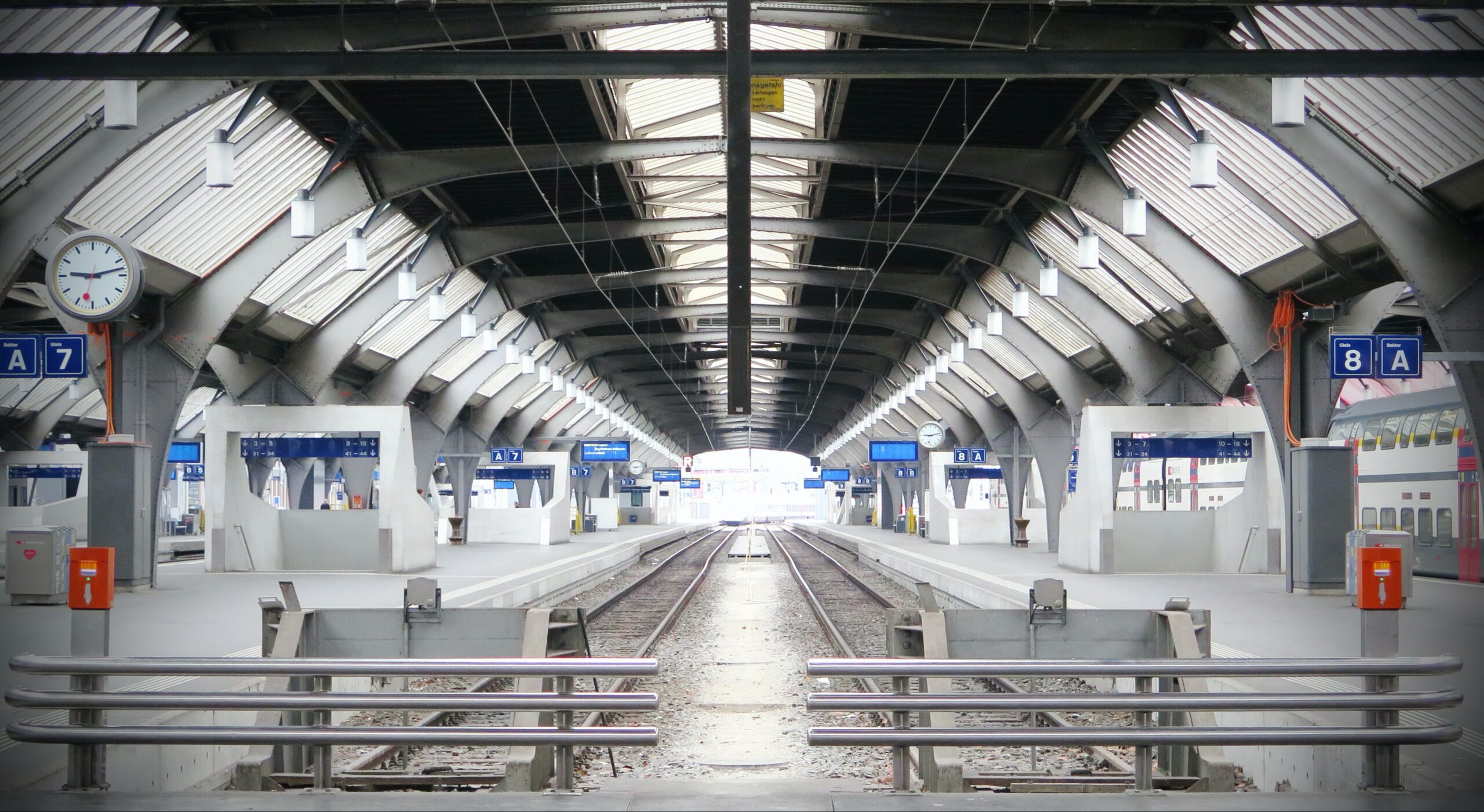
A normally bustling Swiss train station sits empty in April 2020, just weeks after the country moved into lockdown.
A timeline: How Switzerland approached the pandemic
Mid-March 2020: Switzerland enacted a country-wide lockdown closing businesses, schools, entertainment facilities and requiring offices to move to a work-from-home model. Any person who had tested positive for Covid was required to self-isolate for 14 days. The measures were very similar to what was enacted across Europe, except for Sweden, where the country took a “everyone is responsible for preventing infection” approach.
May 2020: The Swiss parliament re-convened for the first time since March and created a Covid-19 task force with Bercet at the head. This helped different Swiss cantons – which had presented a hodgepodge of health measures – respond to one, central unit.
June 2020: One of Bercet’s first moves was to re-open schools for the remaining month of the academic year. Switzerland never closed schools again, prioritizing education over businesses and entertainment. Moreover, masks were not required in schools for the under-12 age group. A study found that Swiss pupils, especially young ones and those from lower socio-economic backgrounds, fared much better than students in neighboring Italy and Germany where school lockdowns lasted three to five months longer than Switzerland’s.
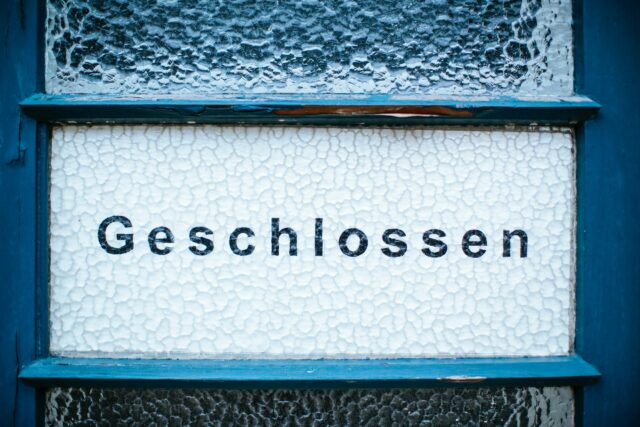
A “closed” sign in German on a store in Zürich in spring 2020.
July 2020: Non-essential stores and restaurants re-opened for takeaway and pick-ups, but remained closed for indoor shopping and dining. Switzerland saw very low Covid case numbers and hospitalizations during the summer.
November 2020: Switzerland hit a new peak with roughly 8,000 new Covid cases a day.
Winter of 2020-2021: Switzerland’s ski slopes were the only ones open in Europe and people from all over flocked to use them.
March 2021: As Covid cases dropped, Switzerland allowed all shops, museums, sports facilities, entertainment and restaurants to re-open with patrons wearing masks.
Spring/summer 2021: Vaccines were made available throughout Switzerland, but they were never mandatory. During the summer of 2021, Switzerland saw new Covid-19 case numbers plummet to just 100 new cases a day. Switzerland then reduced the self-isolation mandate from 14 to 10 days.
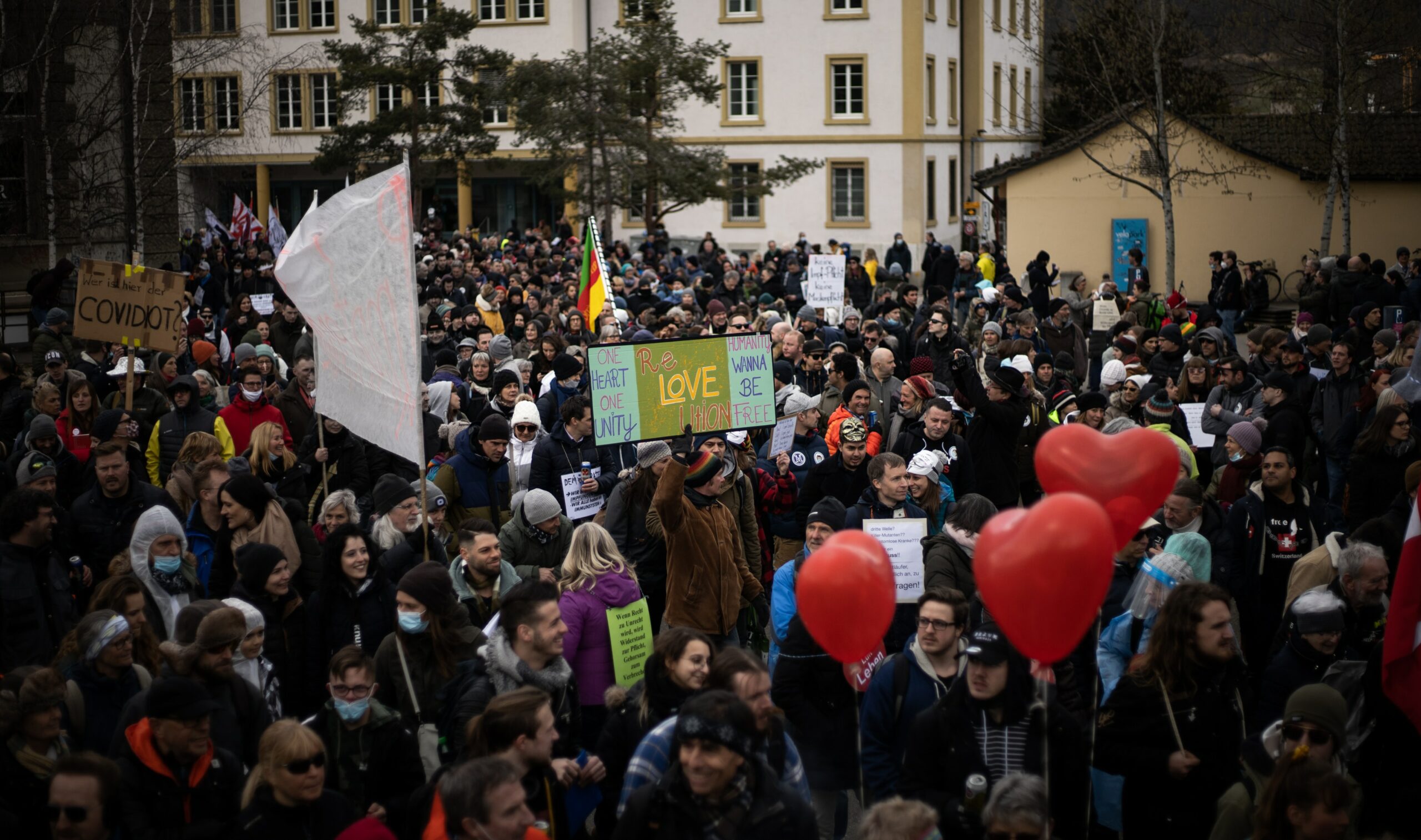
A Covid pass protest in Bern in October 2021 brought out thousands of unhappy residents.
September/October 2021: Switzerland created a QR code-based Covid pass to prove one’s vaccination status. Restaurants required these passes for indoor dining and entertainment facilities. The Swiss Covid pass became the most controversial chapter in the country’s history with the pandemic. Swiss citizens formed large protests in Zürich, Bern and Geneva calling the move discriminatory.
December 2021: While milder variant Omicron spread across Switzerland, the country again reduced the self-isolation mandate from 10 to five days.
February 2022: 90% of Covid restrictions were lifted – such as masks in stores, Covid passes in restaurants and testing travelers.
April 2022: The final 10% of mandates will be dropped. Cantons can decide to re-introduce or prolong measures phased out on the federal level, Bercet said. For example, Bern and Geneva will continue to require masks in health care facilities for now.
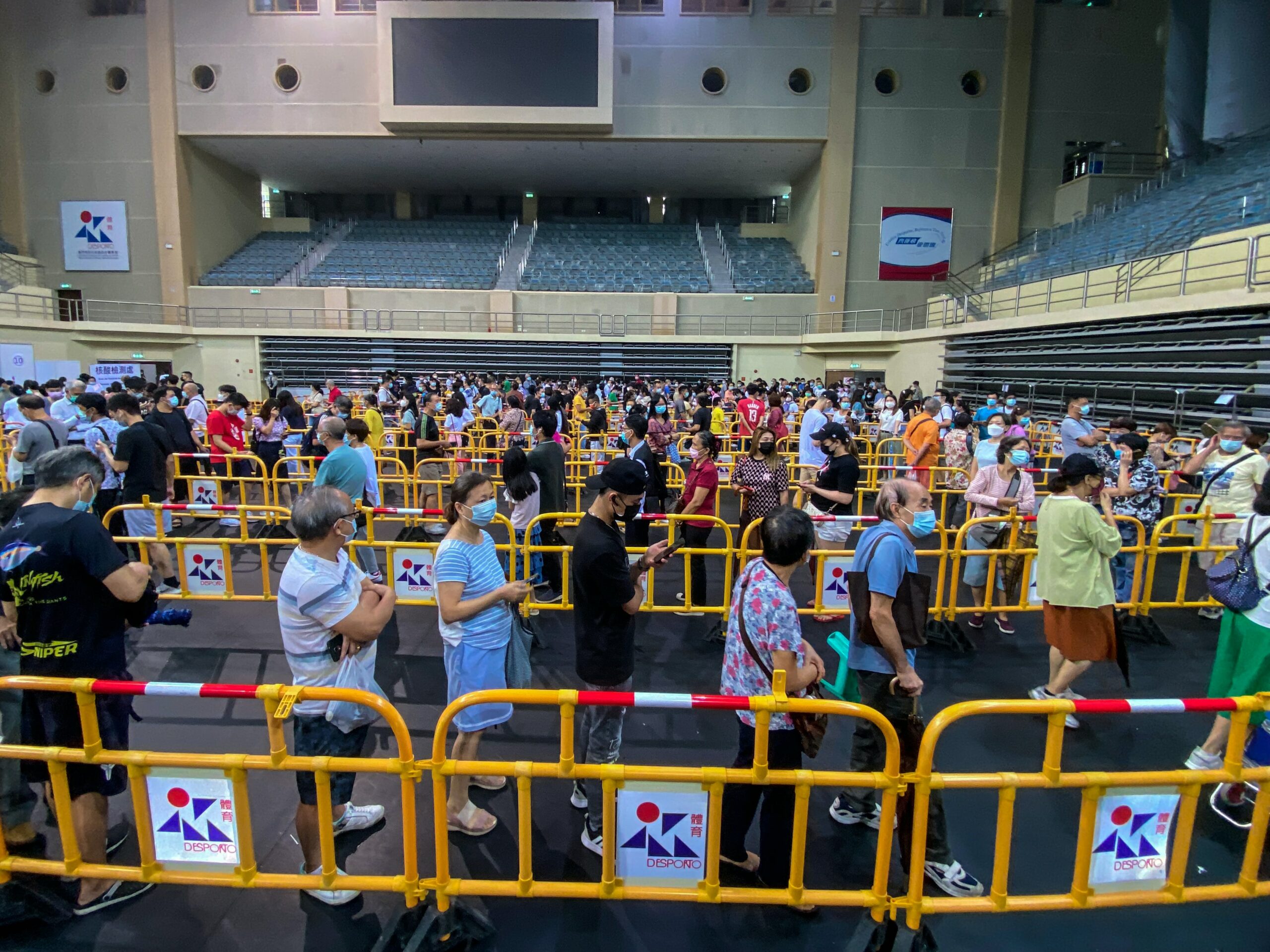
A line of people in Macau, China wait to be tested at one of China’s community testing centers — part of its “Zero Covid” approach.
Covid in other parts of the world
Neighboring countries such as Italy have tightened health pass requirements with tests and fines. Austria made headlines when it became the first European country to impose a vaccine mandate. Greece imposed fines on people ages 60 and older who refused to get vaccinated. And in Germany, every person entering the country older than 6 is required to be vaccinated against Covid.
Ireland, Britain, France and the Netherlands have eased most or all mask mandates and vaccine passes. But those who test positive are still required to self-isolate.
Meanwhile, the strictest Covid-19 measures in the world – China’s “zero Covid” policy – appears to have helped keep new case numbers low, but researchers speculate at what cost to the society. All non-essential businesses are closed, as well as schools and public transportation. Residents must report to regular community testing programs and when a positive case is confirmed, residents may be evicted and sent to quarantine facilities. Travel in and out of the country is strictly limited to only essential people.

Interior Minister Alain Berset has been the face of the Swiss Covid-19 response since June 2020.
Blick in die Zukunft
Despite the “return to normalcy,” Swiss health care officials will continue to monitor Covid-19 cases and fully expect to see more seasons where cases are high, according to minister Bercet. Swiss health researchers believe that Covid will come and go in seasons, much like seasonal colds and flus, and that the country will respond accordingly to those seasons, Bercet said.
